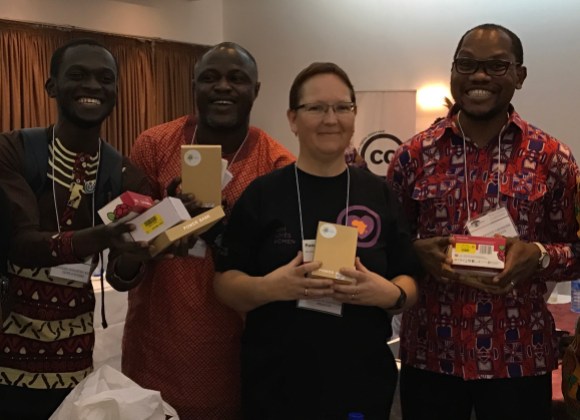
Fundi is a Swahili word for an expert or guru; WikiFundi is a tool that can enable everyone to be an editing expert regardless of their background.
“School children in South African countries refer to each other as being fundi,” the project page explains. “As in, ‘Can you help me with my homework? You’re such a math fundi.’”
Last month at WikiIndaba, the regional conference of the Wikimedia movement in Africa, community members announced WikiFundi to the world. The tool will allow offline editing of Wikipedia. It will be initially distributed in 16 countries in Africa, where it will be helpful whenever constant access to the internet is not available.
Offline editing on WikiFundi “will provide a similar experience to online editing,” said Isla Haddow-Flood and Florence Devouard, the main organizers of WikiAfrica, in a press release early February. Offline contributions will be uploaded to Wikipedia when the device is reconnected to the internet, even briefly.
The problem is particularly acute in developing countries, like those on the African continent. Although the telecommunications market in Africa is growing, most of the region’s inhabitants do not have access to the internet. The lack of this infrastructure plays a role in what is a disproportionate knowledge sharing game. Wikipedia tells us that “Of about 400,000 rural communities that are estimated to exist in Africa, less than 3% have access to a public telephone network.”
WikiFundi is not the first tool to approach this issue on Wikipedia. Several apps, for instance, enable Wikipedia users to download and browse copies of Wikipedia’s content in any language. One of these, Kiwix, recently had its tenth anniversary.
But most, if not all, do not allow offline editing. The Wikimedia Foundation’s executive director Katherine Maher has said that WikiFundi “is not just about creating knowledge or reading knowledge, but about sharing in knowledge.” Similarly, Ghanian Wikimedian Felix Nartey said that it will “increase the reach of Wikipedia to areas that have never heard of the platform and to break the barrier of accessibility through the internet.”
One of the first initiatives that WikiFundi will support is the WikiChallenge African Schools. The challenge will be held at 300 schools participating in the Orange Foundation’s Digital Schools Program in 8 African countries. The program involves over 130,000 school children.
In addition to the Digital Schools Program, the software will help Wikimedia affiliates and individual Wikipedians in over 20 African countries with their outreach activities.
More about WikiFundi can be found in a press release and flyer published by the organizers.
In brief
Enterprise MediaWiki Conference Spring 2017: This week, a suburb of Washington, DC is hosting the second Enterprise MediaWiki Conference, a three-day conference featuring discussions of topics related to “Enterprise MediaWiki,” i.e. the usage of MediaWiki software by and within companies, non-profits, governments, and other organizations. More about the conference program on MediaWiki. Watch the live streaming of the conference on YouTube.
The women you have never met (editing contest): This month, Wikimedia Israel is holding an editing contest on the Arabic Wikipedia. The contest aims at promoting Wikipedia’s content about pioneer women, in addition to helping recruit new editors who are passionate about women’s history. More about the contest and how to join on Meta.
Arabic Wikipedia reaches 500,000 articles: This week, the Arabic Wikipedia community celebrated a new milestone in their efforts to freely share human knowledge.
100 Wiki Women days marathon: The #100WikiDays challenge is a personal commitment in which the participant creates a new article on Wikipedia every day for 100 consecutive days. This month, to commemorate Wiki Women’s History Month, many #100WikiDays contributors are starting a new challenge where they will create only women profiles. More information and how to participate on Meta.
A team of female contributors adds over 300 articles to Wikipedia: In Mangaluru, India, a team of 47 women collaborated on creating over 300 articles on Wikipedia in three Indic languages: Kannada, Tulu and Konkani. The team organized meetups and editathons for the participants over a year where they helped each other with the editing process. More about this project on The Hindu, an Indian news website.
New Wikimedia user groups: This week the Wikimedia Affiliations Committee (AffCom) announced the recognition of five new Wikimedia community user groups: West Bengal Wikimedians user group, Wikimedians of Erzya language user group, Wikimedians of Lëtzebuerg user group, Karavali Wikimedians user group and Wikimaps user group.
Train the trainer program 2017: The center for internet and society in Bangalore, India held a four-day workshop between 19 and 22 February 2017. The workshop was part of their annual train the trainer program. The program aims at empowering leadership development in the Indian Wikipedia community where the participants get training on how to recruit and support new volunteer editors on Wikipedia. More information on the Program page on Meta.
WikiWomen editathon in Warsaw: This weekend, the Wikimedia community in Warsaw, Poland is hosting an editathon to commemorate the women’s history month. Wysokieobcasy, a Polish news website interviewed Natalia Szafran from Wikimedia Poland about Wikipedia’s gender gap and why is it important to organize events like this one. More information about the editathon on Meta and Natalia’s interview on Wysokieobcasy (In Polish).
Samir Elsharbaty, Digital Content Intern
Wikimedia Foundation

Can you help us translate this article?
In order for this article to reach as many people as possible we would like your help. Can you translate this article to get the message out?
Start translation